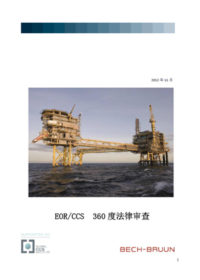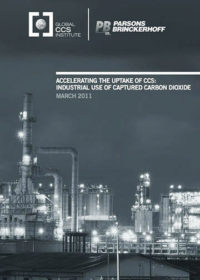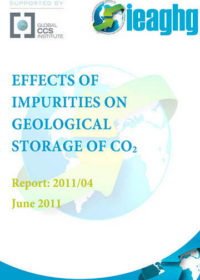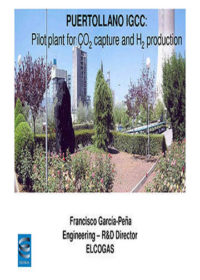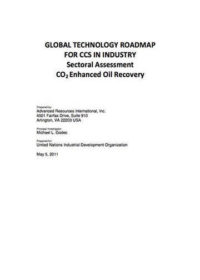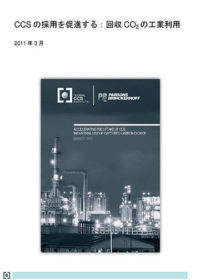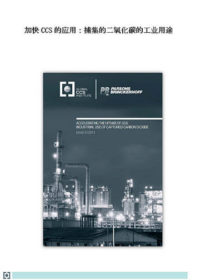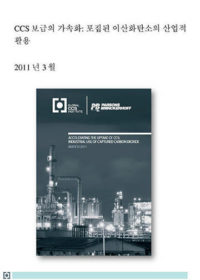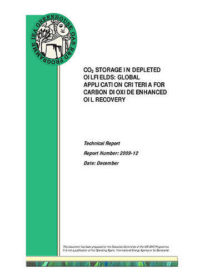Resources
Publications
Our publications, reports and research library hosts over 500 specialist reports and research papers on all topics associated with CCS.
View our Publication Library Disclaimer.
Filter by
EOR/CCS 360 度法律审查
1st November 2012
Topic(s): Carbon capture use and storage (CCUS), CO2 utilisation
本报告将向丹麦的一个结合提高石油采收率(EOR) 和碳捕集与封存(CCS)项目提供重要法律问题的宏观的法规概览。 本报告的目的是评估适用于EOR与CCS联合项目的CCS和ETS (排放权交易)1法规,以及审核其他在丹麦的适用法规,其中包括与丹麦相关的欧盟法规和国际公约及协议。我们将会评估项目周期的个别阶段的适用法规,例如二氧化碳的捕集、二氧化碳的管道或者船舶运输、注入与封存以及把二氧化碳封存地点的责任转移到丹麦。
Disclaimer
The content within the Global CCS Institute Publications, Reports and Research Library is provided for information purposes only. We make every effort and take reasonable care to keep the content of this section up-to-date and error-free. However, we make no claim as to its accuracy, currency or reliability.
Content and material featured within this section of our website includes reports and research published by third parties. The content and material may include opinions and recommendations of third parties that do not reflect those held by the Global CCS Institute.
Accelerating the uptake of CCS: industrial use of captured carbon dioxide
20th December 2011
Topic(s): Carbon capture use and storage (CCUS), CO2 utilisation
Disclaimer
The content within the Global CCS Institute Publications, Reports and Research Library is provided for information purposes only. We make every effort and take reasonable care to keep the content of this section up-to-date and error-free. However, we make no claim as to its accuracy, currency or reliability.
Content and material featured within this section of our website includes reports and research published by third parties. The content and material may include opinions and recommendations of third parties that do not reflect those held by the Global CCS Institute.
Effects of impurities on geological storage of CO2
1st July 2011
Topic(s): Carbon capture use and storage (CCUS), CO2 storage, CO2 utilisation
This study provides a review of existing information and published research on the potential impact of CO2 waste stream purity on storage engineering and associated costs. A range of storage scenarios are considered, including deep saline aquifer formations, depleted gas fields and CO2-EOR schemes, although the study focuses primarily on deep saline formations since this scenario has the largest theoretical storage capacity and the most significant potential for complex geological reactions.
Particular aspects considered include:
- the potential effects of impurities on behaviour and storage capacity calculations;
- effects on the rate of geochemical reactions with both formations and caprock associated buoyant forces and trapping mechanisms;
- potential effects on injectivity, reservoir permeability and caprock integrity both near well-bore and deeper in the formation; and
- potential for corrosion of well components and estimated impacts on system reliability if not mitigated.
Disclaimer
The content within the Global CCS Institute Publications, Reports and Research Library is provided for information purposes only. We make every effort and take reasonable care to keep the content of this section up-to-date and error-free. However, we make no claim as to its accuracy, currency or reliability.
Content and material featured within this section of our website includes reports and research published by third parties. The content and material may include opinions and recommendations of third parties that do not reflect those held by the Global CCS Institute.
Puertollano IGCC: Pilot plant for CO2 capture and H2 production
9th June 2011
Topic(s): CO2 capture, CO2 utilisation
Disclaimer
The content within the Global CCS Institute Publications, Reports and Research Library is provided for information purposes only. We make every effort and take reasonable care to keep the content of this section up-to-date and error-free. However, we make no claim as to its accuracy, currency or reliability.
Content and material featured within this section of our website includes reports and research published by third parties. The content and material may include opinions and recommendations of third parties that do not reflect those held by the Global CCS Institute.
Global technology roadmap for CCS in industry. Sectoral assessment: CO2 enhanced oil recovery
5th May 2011
Topic(s): Carbon capture use and storage (CCUS), CO2 utilisation
The United Nations Industrial Development Organization and the International Energy Agency are developing a Global Technology Roadmap for CCS in Industry (the Roadmap), due to be released mid–year. The project has been sponsored by the Global CCS Institute and the Norwegian Ministry of Petroleum and Energy.
The Roadmap will be a valuable resource to stakeholders, including policy makers and regulators across the globe. Targeted at policymakers, the Roadmap will be a high-level assessment of the key actions and milestones that need to be undertaken to develop CCS in industry.
The following in-depth, technical sectoral assessments have been undertaken to inform the direction of the Roadmap:
- biomass;
- high-purity;
- iron and steel;
- refineries;
- cement; and
- enhanced oil recovery.
Disclaimer
The content within the Global CCS Institute Publications, Reports and Research Library is provided for information purposes only. We make every effort and take reasonable care to keep the content of this section up-to-date and error-free. However, we make no claim as to its accuracy, currency or reliability.
Content and material featured within this section of our website includes reports and research published by third parties. The content and material may include opinions and recommendations of third parties that do not reflect those held by the Global CCS Institute.
CCSの採用を促進する:回収CO2の工業利用
1st March 2011
Topic(s): Carbon capture use and storage (CCUS), CO2 utilisation
本報告書の基本目的は、CO2回収貯留(CCS)の開発及び商用規模での実施を促進するためにCO2の既存及び新たな利用法を調査し、工業分野におけるCO2の回収と再利用の可能性を検討することである。本報告書では、石油増進回収(EOR)などの成熟技術の近い将来の利用及び技術開発の初期段階にあるいくつかの有望な新技術の将来的な利用の両方について検討する。
世界のCO2再利用に関する市場規模は、現在約8千万トン/年であり、北米のEOR需要がその大半を占める。EORの年間CO2需要量は約5千万トンで、そのうち年間4千万トン前後はCO2貯留層から自然に産するCO2が供給されており、その価格は通常約15~19米ドル/トンである。
人為起源CO2の潜在的供給量は、潜在的需要量よりもはるかに大きい。世界で年間約5億トンの低コスト(20米ドル/トン未満)・高濃度のCO2が、天然ガス処理、肥料プラント及びその他の工業排出源の副産物として利用可能である。高コストではあるが(50~100米ドル/トン)、発電所、製鉄所及びセメント工場から現在排出されている希釈CO2流から、年間約180億トンを回収できる。
CO2のEORへの再利用は、既存の北米のCCSプロジェクトの収益源であり、EORは北米の多くのCCSプロジェクトの計画に盛り込まれている。世界各地、特に新興国及び発展途上国では、CCS開発の経済的な触媒として、EORの可能性が検討されている。本報告書で検討する重要な課題は、EOR及びその他のCO2の再利用技術がCCSの採用とその商業展開を促進できるのかどうかの是非及びその程度である。
再利用のための高濃度CO2の将来的な供給量及び市場価格は、政府によるCO2排出に対する規制又は罰則の適用の程度に大きく影響される。したがって、本報告書ではCO2の再利用がCCSの開発を促進する可能性について、炭素規制及び炭素価格が弱い場合並びにそれらが強い場合の双方の状況下における、CO2回収コストの高低とそれらの状況との関係について検討している。
Disclaimer
The content within the Global CCS Institute Publications, Reports and Research Library is provided for information purposes only. We make every effort and take reasonable care to keep the content of this section up-to-date and error-free. However, we make no claim as to its accuracy, currency or reliability.
Content and material featured within this section of our website includes reports and research published by third parties. The content and material may include opinions and recommendations of third parties that do not reflect those held by the Global CCS Institute.
加快CCS的应用: 捕集的二氧化碳的工业用途
1st March 2011
Topic(s): Carbon capture use and storage (CCUS), CO2 utilisation
本报告的基本目的是调查二氧化碳现有的和新兴的用途并研究捕集与再利用二氧化碳对于工业应用的潜力以便加快CCS的开发和商业推广。它既考虑近期成熟技术的应用例如提高石油采收率(EOR)也考虑许多仍然处于其技术开发初级阶段的、有前景的新技术的较长期应用。
Disclaimer
The content within the Global CCS Institute Publications, Reports and Research Library is provided for information purposes only. We make every effort and take reasonable care to keep the content of this section up-to-date and error-free. However, we make no claim as to its accuracy, currency or reliability.
Content and material featured within this section of our website includes reports and research published by third parties. The content and material may include opinions and recommendations of third parties that do not reflect those held by the Global CCS Institute.
CCS보급의 가속화: 포집된 이산화탄소의 산업적 활용
1st March 2011
Topic(s): Carbon capture use and storage (CCUS), CO2 utilisation
Disclaimer
The content within the Global CCS Institute Publications, Reports and Research Library is provided for information purposes only. We make every effort and take reasonable care to keep the content of this section up-to-date and error-free. However, we make no claim as to its accuracy, currency or reliability.
Content and material featured within this section of our website includes reports and research published by third parties. The content and material may include opinions and recommendations of third parties that do not reflect those held by the Global CCS Institute.
Role of enhanced oil recovery in accelerating the deployment of carbon capture and sequestration
23rd July 2010
Topic(s): CO2 utilisation
On July 23, 2010, the MIT Energy Initiative (MITEI) and the Bureau of Economic Geology at the University of Texas (UT-BEG) co-hosted a symposium on the Role of Enhanced Oil Recovery (EOR) in Accelerating the Deployment of Carbon Capture and Sequestration (CCS). The motivation for the symposium lies with the convergence of two national energy priorities: enhancement of domestic oil production through increased tertiary recovery; establishment of large-scale CCS as an enabler for continued coal use in a future carbon-constrained world. These security and environmental goals can both be advanced by utilizing the carbon dioxide (CO2) captured from coal (and natural gas) combustion for EOR, but many questions remain about the efficacy and implementation of such a program at large scale. The symposium aimed to lay out the issues and to explore what might be an appropriate government role.
Disclaimer
The content within the Global CCS Institute Publications, Reports and Research Library is provided for information purposes only. We make every effort and take reasonable care to keep the content of this section up-to-date and error-free. However, we make no claim as to its accuracy, currency or reliability.
Content and material featured within this section of our website includes reports and research published by third parties. The content and material may include opinions and recommendations of third parties that do not reflect those held by the Global CCS Institute.
CO2 storage in depleted oilfields: global application criteria for carbon dioxide enhanced oil recovery
21st December 2009
Topic(s): Carbon capture use and storage (CCUS), CO2 storage, CO2 utilisation
The main aim of the study was to reassess the likely future potential storage capacity for CO2 in depleted oil fields as part of EOR operations across the world. The study also aimed to identify the key technical, economic and regulatory barriers that may be preventing widespread application of CO2-EOR globally as a means of providing an early opportunity for CO2 storage.
Previous IEA GHG studies estimated the global storage potential in depleted oil and gas fields as up to 1,000Gt CO2, 120Gt of which could be stored in association with CO2-EOR operations. Although therefore providing lower potential capacity than both deep saline formations and gas fields, depleted oilfields still constitute a valuable storage resource with extensive repositories of data and knowledge. Storage operations in oil fields would generally be smaller in scale compared to gas fields and aquifers, but the economic and commercial benefits of utilising CO2 for EOR could in theory provide an immediate driver for implementation of such projects, particularly in a period of high global oil prices. The stimulus of high oil process has led to the increasing development of CO2 flood operations in recent years, including at the Weyburn oil field in Canada which has extended the profitability of that field for the operator Encana.
IEA GHG thus identified CO2-EOR operations as an early opportunity for CO2 storage in 2002. However despite developments like those in the Permian Basin, midcontinental and Gulf Coast USA, and at Weyburn, wide scale global development of CO2-EOR has not occurred in spite of current high oil prices. Furthermore, a majority of existing CO2-EOR schemes have not been designed with CO2 storage as an objective. The aim of this study is to understand why this early opportunity for CO2 storage has not been realised and when or if this might occur.
Disclaimer
The content within the Global CCS Institute Publications, Reports and Research Library is provided for information purposes only. We make every effort and take reasonable care to keep the content of this section up-to-date and error-free. However, we make no claim as to its accuracy, currency or reliability.
Content and material featured within this section of our website includes reports and research published by third parties. The content and material may include opinions and recommendations of third parties that do not reflect those held by the Global CCS Institute.
